Starved Syria civilians flee besieged Damascus suburb
- Published
The BBC's Lyse Doucet was there to witness thousands of Syrians fleeing their home after nine months under siege
Thousands of Syrian civilians have finally been allowed to leave the besieged Damascus suburb of Moadamiya.
The BBC's Lyse Doucet, who was at the scene, describes a tide of desperate people leaving the area, which has been closed off since March.
Supplies in Moadamiya had been running desperately short, and residents had pleaded to be saved from starvation.
The exodus of civilians has been made possible by an apparent relaxation of a blockade by government forces.
The Syrian army had previously said that rebel-held areas of Damascus such as Moadamiya could surrender or starve.
At least three of Damascus's suburbs - Yarmouk, Eastern Ghouta and Moadamiya - have been besieged by government forces for several months.
The situation has become so desperate that earlier this month Muslim clerics issued a religious ruling allowing people to eat cats, dogs and donkeys just to survive.
Those animals are usually considered unfit for human consumption in Islam.
Eating grass
For months, the UN and other aid agencies have been calling for urgent help, fearing the worst for the people of Moadamiya.
"We didn't see a piece of bread for nine months," one woman told the BBC. "We were eating leaves and grass."
The Minister for Social Affairs, Kinda Al Shamamat, who was overseeing the evacuation, has accused rebel gunmen - whom she describes as terrorists - of infiltrating Moadamiya.
But rebel fighters - who have stayed behind in the suburb - accuse the government of trying to starve them into submission.
Now that most civilians have fled, the battle will intensify, our correspondent says.
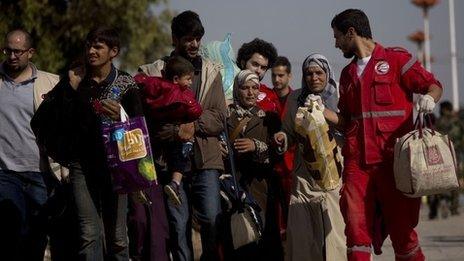
The people of Moadamiya were running short of food and water

Moadamiya has been under siege and heavy bombardment since March - with no one able to get in or out
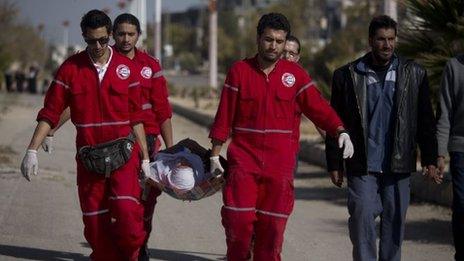
Some were too ill to walk, and had to be assisted by Red Crescent workers
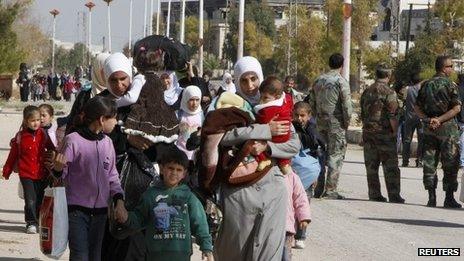
Most of those trapped were women and children
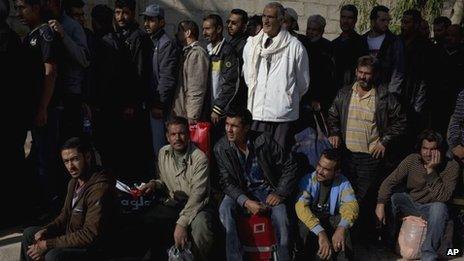
The men were taken to a separate area, to be searched by the military
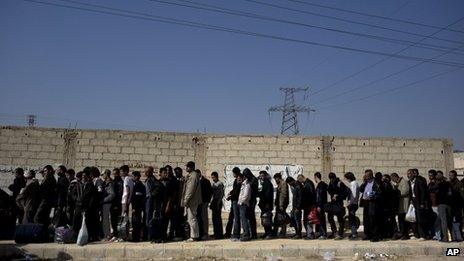
The army wants to check if any of these men were fighting on the rebels' side
Polio outbreak
The World Health Organization has confirmed 10 cases of polio in Syria - the first outbreak in the country in 14 years.
Save the Children's Brie O'Keefe: Syria polio is "a deterioration in global progress"
The UN body says a further 12 cases are still being investigated.
Before Syria's civil war began in 2011, some 95% of children in the country were vaccinated against the disease, but now an estimated 500,000 children have not been immunised.
There has been speculation that foreign groups fighting in Syria may have imported polio into the country.
The disease has been largely eradicated in developed countries but remains endemic in Nigeria, Pakistan and Afghanistan.
Meanwhile Syria's Deputy Prime Minister, Qadri Jamil, was dismissed on Tuesday for leaving the country and acting without government permission, state media said.
Mr Jamil met US officials in Geneva over the weekend to discuss peace negotiations, according to UN and Middle East officials.
But the state news agency Sana said Mr Jamil had been dismissed by President Bashar al-Assad "because he left his centre of work without prior permission and did not follow up on his duties".
"Additionally, he undertook activities outside the nation without co-ordinating with the government," Sana said.
- Published29 October 2013